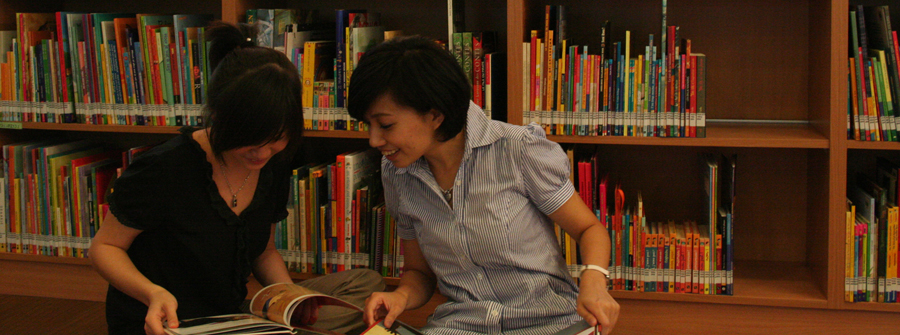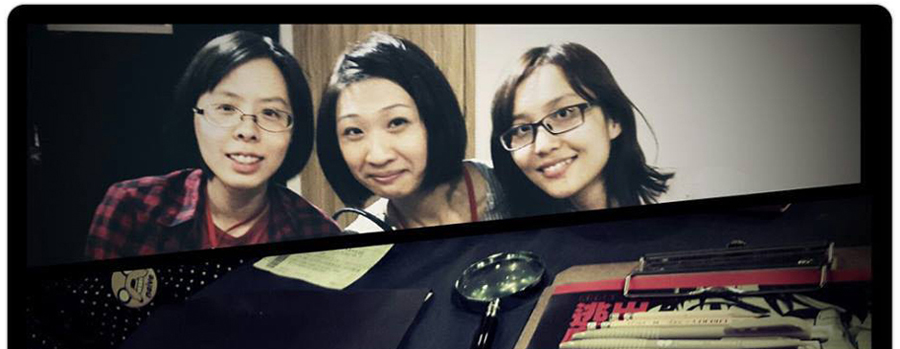
A proposal was made in 1957 to establish the Department of Library Science, and after five years of discussions, the Department was officially established on June 20, 1961. In the beginning, the mission of the department was to cultivate professional talents for libraries, and later on the department started to actively promote the research of library science, the development of libraries and the further development of professional practice in the field of library and information science. Master’s and PhD programs were established at the department in 1980 and 1989 respectively, turning the department into the first institute of library science in Taiwan with all three programs, and it continued to cultivate professional talents in this field. In its first year, the department took 25 students. Currently the department admits more than 60 students each year and has over 2000 graduates.
The rapid development of information technology and the coming of the internet age have diversified people’s demand for information as well as the ways of obtaining information. Besides basic library science, the Department of Library Science has expanded the scope of its education and research to include information science, educational technology, knowledge management and other related fields. For the sake of keeping up with current trends in the modern world, the department officially changed its name to the Department and Graduate Institute of Library and Information Science (DGILIS) in 1998 and continued its mission of cultivating talents for libraries and various information service organizations. In order to increase the number of avenues for librarians to receive of on-the-job training so that there can be more mid to high level managers in various libraries, thus improving the management in said libraries, DGILIS established the “Continuing Master’s Program” during the 2003 academic year. In the 2009 academic year, the continuing master’s program was integrated into the department’s master’s program.
In order to facilitate teaching and research, DGILIS has a rich collection of books as well as modern teaching and A/V equipment. It also equipped with a human-computer-interaction lab, a multimedia A/V center, a department internship library, and a computer lab, making it the most optimal learning environment for library and information science students in Taiwan. The research and education in this department emphasize information content and information service. This department also plays an important role in the development of government information policies.
In order to assist the government in building information infrastructure, the future development of DGILIS lies in collecting, organizing and analyzing information, sorting and researching human information behavior, planning and designing information service systems, disseminating information resources, providing information services, etc. This will hopefully allow us to integrate information and technology and to achieve our educational goals.
At the same time, DGILIS faculty keep up with the trends in the information society and conduct cutting-edge information research that is both interdisciplinary and integrated with technology. DGILIS faculty research is not limited within the field of library and information science; they also conduct collaborative research typically involves scholars in computer engineering, information management, communication technologies, and many other fields. The department has also continued to strengthen cooperative relations with the Department of Computer Science and Information Engineering, the Department of Information Management, the Department of Business Administration and the Department of Bio-Industry Communication and Development in order to jointly establish inter-disciplinary programs on knowledge management, creative business start-up, and communications, and to cultivate the diverse talents needed in today’s information society.

Objectives
DGILIS offers Bachelor’s, Master’s and doctoral programs, making it the first department of library and information science in Taiwan to have a complete educational system. DGILIS strives to cultivate information capabilities in students and promotes information literacy. Our educational objectives include:
1. Prepare students with basic knowledge and skills that they need to be in part of the information value chain. This includes the ability to evaluate, organize, preserve, search, utilize and disseminate information.
2. Cultivate future information professionals by instilling in students essential knowledge and skills that are required when working in various types of libraries. The ultimate goal is to prepare information leaders who will contribute to the society.
3. Cultivate future faculty members and researchers in LIS and related fields. The ultimate goal is to improve the quality of research in this field and to increase the visibility and impact of local research in international academia.
Core Competencies
Based on DGILIS educational objectives, below are the 9 core competencies that students will develop upon their completion of their degrees:
1. Basic knowledge of library and information science
2. Ability to provide reader services and reference services
3. Ability to use and manage information resources
4. Ability to organize information and knowledge
5. Ability to manage and utilize information technologies
6. Ability to disseminate information
7. Ability to provide information literacy education
8. Ability to manage a library or an information center
9. Ability to solve various information problems and to conduct fundamental research

DGILIS is the first library and information science department in Taiwan that offers Bachelor’s, Master’s and PhD programs. Among all library schools, there are most full-time faculty members. DGILIS faculty members have diverse research interests and teach diverse courses. This greatly helps students develop extensive professional knowledge and skills in library and information science. As to the facilities, DGILIS is housed in its own department building and is equipped with abundant hardware and software resources. This allows faculty and students in the department to conduct research and participate in various learning activities. The department is the only library and information science department in Taiwan that has an internship library . The size of the library space and its collection are also superior to other departments of its kind in Taiwan. In addition, DGILIS has a dedicated research area for children’s literature that supports the needs of its faculty and students. The mission of our department is described below:
1. Emphasize the cultivation of professional knowledge and skills as well as collaboration with the public and private sectors
The department works jointly with organizations outside of school to offer internships to increase practical competences of students and gives students opportunities to practice the theories they learned in school. The organizations that DGILIS works with include public libraries, the National Central Library, the National Palace Museum Library, publishers (e.g., Commonwealth magazine), bookstores (e.g., Eslite, Books.com.tw), information service companies (e.g., Flysheet, udndata.com) and various enterprises.
2. Cultivate critical thinking and creativity in students
In addition to professional core competencies, DGILIS emphasizes cultivating macro viewpoints, critical thinking and creativity in its students. To achieve this goal, the department and the university offer students various opportunities to gain international experiences. Students can take advantage of the international exchange programs, conferences, research forums, and many other activities.
3. Work closely with the university library and prepare students with quality practical experience
The department maintains a close relationship with the NTU Library. Most previous NTU Library directors have been full-time faculty members of DGILIS, and almost all managers of the various divisions within the NTU Library have been faculty or distinguished alumni of DGILIS. The NTU library’s rich collections and ample space fully support research conducted by faculty and students in DGILIS. The library provides the department with resources and space to organize various academic events; the library also gives students opportunities to learn through part-time jobs, making it the best place for students to learn and get acquainted with practical library experiences.
4. Offer diverse education and academic activities
Besides educational activities during the semesters, DGILIS also assists the Library Association of the Republic of China (Taiwan) in organizing training programs on various topics during the summer vacation. These trainings give librarians and information professionals an avenue to pursue continuing education and gain advance professional knowledge. For DGILIS students, NTU has an abundance of academic resources and great hardware/software. The university also provides diverse general courses and courses outside the department, giving students who would like to double major or minor in other fields many options to choose from.
As for academic activities, DGILIS publishes a biannual peer-reviewed journal—Journal of Library and Information Studies—which is one of the top-rank LIS journals. The Student Association of DGILIS publishes Shu-fu. It is a periodical compiled and published by the students of the department which features academic papers written by the students and faculty of DGILIS. The department also regularly organizes international academic conferences and workshops for graduate students to exchange ideas/experiences and for faculty to share their teaching/research experiences. In order to execute the “Aim for the Top University Project” proposed by the Ministry of Education, DGILIS has offered academic resources and formed research groups to strengthen the overall research capacity of the department.
5. Actively promote international academic exchanges
Besides organizing international conferences and providing avenues for the exchange of research ideas and experiences, DGILIS also regularly joins important international associations in the field of library and information science. The department has established exchange partnerships with academic research organizations in other countries, and has invited visiting professors to the department. Our faculty members have also been actively working on international research projects. All our endeavors allow DGILIS to obtain better academic resources for teaching and for research, and contribute to the overall research performance of the department.

DGILIS has the largest collection of books on library and information studies in Taiwan. It founded the only library and information science internship library in Taiwan, one of the few such libraries around the world. The department library not only supports the teaching and research needs of the department faculty and students, but also serves as the best place for students to gain practical library experiences. The library also benefits scholars in the field nationwide.
The space in the department building readily accommodates the teaching and research needs of our faculty. In addition to the library, there are several conference rooms and classrooms in the building. The conference rooms are mainly for teaching and class discussions, and these rooms can also be used for research interviews. Most classrooms are equipped with computers, projectors, and smart boards so that faculty can easily teach with multimedia tools. There is also a computer lab for students to learn LIS specific software and to work on their class assignments.
In order to meet the demands for the creation of A/V teaching materials, DGILIS also offers an A/V classroom that is equipped with a(n) document camera/opaque projector, a smart board, and other A/V equipment. The department office and the computer lab also offers digital cameras, video recorders, and other professional software for class-use check out. Students can use the equipment to create multimedia works and then edit their creations in the computer lab.
To facilitate interactions among peers, the department designs and provides a learning commons for undergraduate students and a large office for graduate students. These facilities create a comfortable environment that foster peer learning.